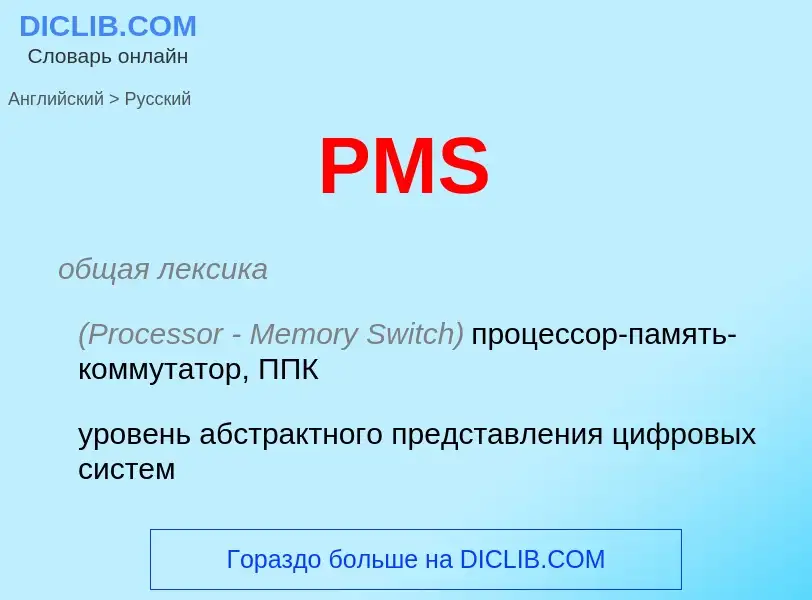Traducción y análisis de palabras por inteligencia artificial ChatGPT
En esta página puede obtener un análisis detallado de una palabra o frase, producido utilizando la mejor tecnología de inteligencia artificial hasta la fecha:
- cómo se usa la palabra
- frecuencia de uso
- se utiliza con más frecuencia en el habla oral o escrita
- opciones de traducción
- ejemplos de uso (varias frases con traducción)
- etimología
PMS - traducción al ruso
общая лексика
(Processor - Memory Switch) процессор-память-коммутатор, ППК
уровень абстрактного представления цифровых систем
сокращение
[planned maintenance system] система планово-предупредительного технического обслуживания
[preventive maintenance service] профилактическое техническое обслуживание
[preventive maintenance system] система профилактического технического обслуживания
Смотрите также
медицина
предменструальное напряжение
[pri:'menstruəl]
медицина
предменструальный
прилагательное
физиология
предменструальный
Wikipedia
Premenstrual syndrome (PMS) is a disruptive set of emotional and physical symptoms that regularly occur in the one to two weeks before the start of each menstrual period. Symptoms resolve around the time menstrual bleeding begins. Different women experience different symptoms. Premenstrual syndrome commonly produces one or more physical, emotional, or behavioral symptoms, that resolve with menses. The range of symptoms is wide, and most commonly are breast tenderness, bloating, headache, mood swings, depression, anxiety, anger, and irritability. To be diagnosed as PMS, rather than a normal discomfort of the menstrual cycle, these symptoms must interfere with daily living, during two menstrual cycles of prospective recording. These symptoms are nonspecific and are seen in women without PMS. Often PMS-related symptoms are present for about six days. An individual's pattern of symptoms may change over time. PMS does not produce symptoms during pregnancy or following menopause.
Diagnosis requires a consistent pattern of emotional and physical symptoms occurring after ovulation and before menstruation to a degree that interferes with normal life. Emotional symptoms must not be present during the initial part of the menstrual cycle. A daily list of symptoms over a few months may help in diagnosis. Other disorders that cause similar symptoms need to be excluded before a diagnosis is made.
The cause of PMS is unknown, but the underlying mechanism is believed to involve changes in hormone levels during the course of the whole menstrual cycle. Reducing salt, alcohol, caffeine, and stress, along with increasing exercise is typically all that is recommended for the management of mild symptoms. Calcium and vitamin D supplementation may be useful in some. Anti-inflammatory drugs such as ibuprofen or naproxen may help with physical symptoms. In those with more significant symptoms, birth control pills or the diuretic spironolactone may be useful.
Over 90% of women report having some premenstrual symptoms, such as bloating, headaches, and moodiness. Premenstrual symptoms generally do not cause substantial disruption, and qualify as PMS in approximately 20% of pre-menopausal women. Antidepressants of the selective serotonin reuptake inhibitors class may be used to treat the emotional symptoms of PMS.
Premenstrual dysphoric disorder (PMDD) is a more severe condition that has greater psychological symptoms. PMDD affects about 3% of women of child-bearing age.

